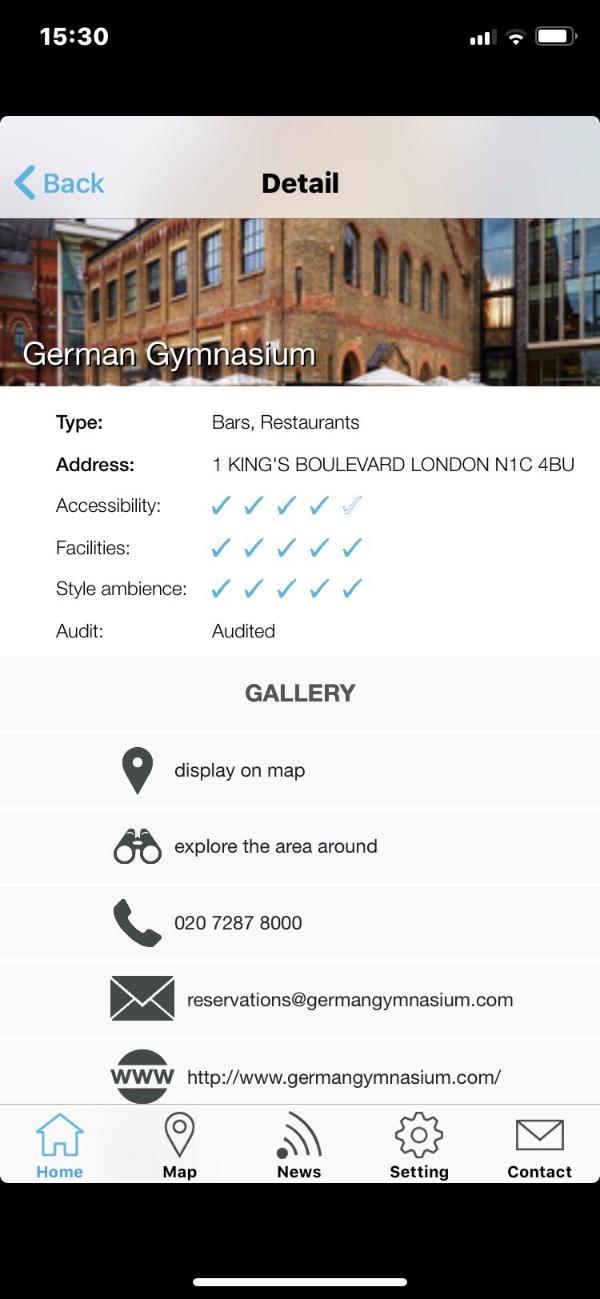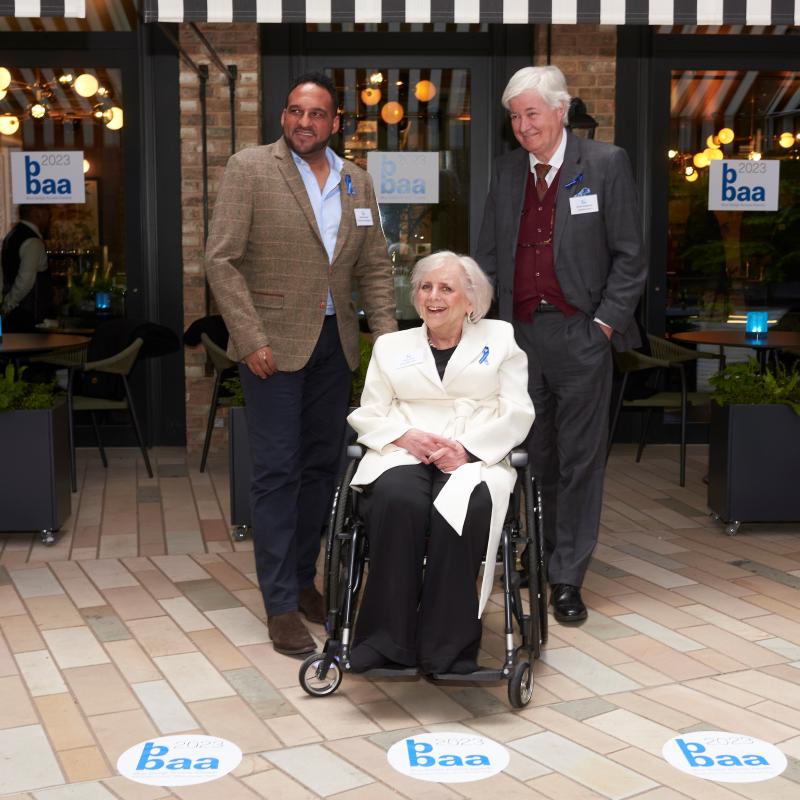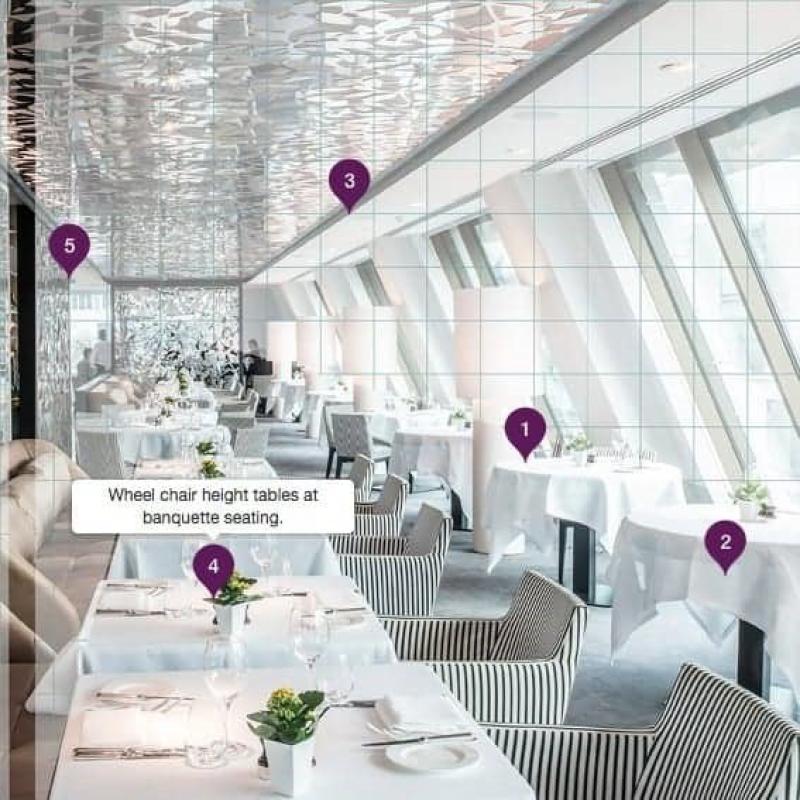Entrepreneur creates a digital guide for disabled people to identify and review accessibility of public restaurants and hotels, and promote social inclusion
A little over a decade ago, Fiona Jarvis was selling software systems in London when she started to notice she was losing her balance. Tests showed she had multiple sclerosis. As she grew progressively disabled, she says it became more difficult to do her job. “If I was taking someone for lunch, I had to make sure there was a disabled toilet, that there were no steps,” Fiona says. “If they had a plush carpet, for example, it would have been difficult to walk with a stick.”
She began making mental notes about the accessibility of restaurants, hotels, and similar venues. After realising the information could be useful to other people, she decided to create a website where she could publish it for all to see.
Fiona attended an app development course at University College London, where the professor offered to develop an app for her reviews. Blue Badge Style was born.
A guide for disabled people
The Blue Badge Style app and website are like a Michelin guide for disabled people. Fiona and a small staff of volunteers write the content, taking into account design style, accessibility, and facilities. They rate venues in the United Kingdom and Europe on a scale of zero to three Blue Badge Style check marks. Users can also contribute by submitting reviews of places they have been.

The Blue Badge Style application allows users to rate places based on accessibility and style
For example, a two-check mark review of a London oyster bar notes that, “You have to queue for a table but it’s worth it as the seafood platter is an occasion on its own. There are steps at the main entrance, but the waiters will bring a portable ramp. Unfortunately, the restaurant toilets have grab rails but are not big enough for a wheelchair.”
Fiona, who now gets around in a wheelchair, believes that disability shouldn’t prevent anybody from going out and enjoying life.
“Style is important to disabled people too,” says Fiona. “It’s important to their well-being, their mental health. Style also applies to more than just big brands, it can include biker bars for example, places that aren’t necessarily expensive.”
Fiona gave three check marks to a favourite hotel: “The [entrance] ramp is a little steep, but the doorman is very helpful. The bar is extremely spacious so there’s plenty of room for wheelchairs and the floor is smooth for walking stick users.”
In 2014, the company earned first prize for the special category “Urban and Natural Environment” in the European Investment Bank Institute’s Social Innovation Tournament, which recognises social entrepreneurs making positive social, ecological, or environmental impact in their communities.
Awarding accessibility and design style
The business expanded to include an annual Blue Badge Access Award in 2016, which Fiona co-created with hotelier Robin Sheppard, who has Guillain-Barré syndrome.
“He had a design competition to improve the experience of disabled guests,” she explains. “Disabled people used to get a hospital-like room, not the same as everyone else. He wanted to make designers aware that disabled people want to stay in nice places too.”

Blue Badge Style Awards launch with from left to right: chef Michael Caines Fiona Fiona, Founder and Robin Sheppard, Co-Founder of the Awards
They established several different categories, including Best Bar, Ludicrous Loo, and for the first time this year, Best International Venue.
The award isn’t just for hotels and restaurants. In 2017, they gave 10 Downing Street an award for investing in an extremely stylish wheelchair lift. The Access Award also includes a design competition with a £20 000 prize for the best innovations serving disabled guests.
Fiona says the Access Award is becoming even more important than the website and is supported by sponsors who realise that its target demographic represent a vast untapped market for tourism, hospitality, and services. “It’s not just the disabled person, it’s also their friends and family,” she says. “In the UK, it’s about 25% of the population, and you don’t want to exclude 25% of the population.”
In 2022, one of Sheppard’s suppliers conducted an audit that revealed they earned £200 000 more in revenue per year by having an accessible hotel.
When businesses consider disabled people as a source of income rather than a health and safety issue, it can result in greater social inclusion.
Virtual tours for the disabled
Blue Badge Style also finances itself via Access Galleries and accessibility audits, visiting places and taking photos, so people can have a visual overview of the facilities and obstacles before they make the trip.

Access Galleries gives people a visual overview of facilities and their accessibility
Now, Fiona would like to gamify the app. “The idea is you have an avatar that depicts your disability and takes you through a hotel or restaurant, showing the features that are important to you.”
Blue Badge Style has enriched the lives of thousands. Among the feedback it has received, a reader and long-time amputee with a passion for designer handbags wrote, “WOW! What a great website. I stumbled upon it while looking for comfy crutch tops and hand pads…Kudos to you, Fiona, for your courage, humour and STYLE. I feel like I just met a kindred soul.”
